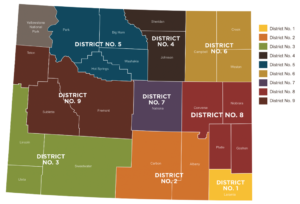
The Wyoming Judiciary is divided into nine districts. The WY county map to the right illustrates where each district occurs. Each judicial district has Circuit Courts and District Courts. The Wyoming Supreme Court serves the entire state.
According to the Wyoming State Bar Judicial Branch FAQ page:
The Wyoming Supreme Court is the highest level of court in the state and its decisions on issues of state law are final. It hears appeals from district court decisions and petitions for extraordinary relief from lower court decisions.
The district courts hear felony criminal cases, civil cases where more than $50,000 is sought, juvenile matters and probate matters. They also hear appeals from lower court decisions. The work of the district courts includes trials in the most serious cases. There are 23 district judges, organized into nine judicial districts.
There are circuit courts in all 23 counties within the nine judicial districts. Circuit courts hear all misdemeanor criminal cases and civil cases where less than $50,000 is sought. Circuit courts also hear family violence, stalking, and forcible entry and detainer cases. The circuit courts may set bail for people accused of crimes, and conduct preliminary hearings in felony cases.
On March 15, 2019, Governor Gordon signed into law an act of the 2019 Wyoming legislature creating a Chancery Court, whose purpose is to provide a forum for streamlined resolution of commercial, business, and trust cases. The act establishes a court with jurisdiction to decide actions seeking declaratory or injunctive relief and actions seeking money recovery over $50,000 that arise from claims including breach of contract, breach of fiduciary duty, fraud, derivative actions, the Uniform Commercial Code, and the Uniform Trust Code. The Wyoming Supreme Court adopted final rules for the Chancery Court on September 21, 2021.
Municipal courts operate in some incorporated cities and towns. Municipal Courts are not state courts and only have jurisdiction over issues involving municipality’s ordinances. A municipal court judge may assess penalties of up to $750 and/or six months in jail. Decisions in Municipal Courts may be appealed to the District Courts. Municipal court judges are generally appointed by the mayor with the consent of the municipal council. The municipality sets their terms. Most municipal judges are part-time positions and many are lawyers.